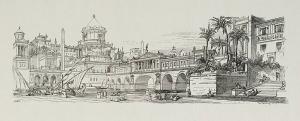“Please Hit ‘Subscribe’”! If you’ve received benefit from this or any of my 4,500+ articles, please follow this blog by signing up (email address) on the sidebar to the right, above the icon bar, “Sign Me Up!”: to receive notice when I post a new blog article. This is the equivalent of subscribing to a YouTube channel. Please also consider following me on Twitter / X and purchasing one or more of my 55 books. All of this helps me get more exposure and concretely supports my full-time apologetics work. Thanks so much and happy reading!
*****
You may, if you choose, purchase salvation, though of inestimable value, with your own resources, love and living faith, which will be reckoned a suitable price. (Exhortation to the Heathen, ch. 9)
And the Word, having unfolded the truth, showed to men the height of salvation, that either repenting they might be saved, or refusing to obey, they might be judged. This is the proclamation of righteousness: to those that obey, glad tidings; to those that disobey, judgment. . . . Cleanse the temple; . . . wisely cultivate the fruits of self-command, and present yourself to God as an offering of first-fruits, that there may be not the work alone, but also the grace of God; and both are requisite, that the friend of Christ may be rendered worthy of the kingdom, and be counted worthy of the kingdom. (Exhortation to the Heathen, ch. 11)
For prophecy is given by reason both of obedience and disobedience: for obedience, that we may be saved; for disobedience, that we may be corrected. (The Instructor, Bk. I, ch. 2)
For I will disclose my ways, and lay before you good commandments; by which you will reach salvation. (The Instructor, Bk. III, ch. 12)
. . . salvation . . . the portion of him who lives according to the commandments . . . (The Stromata, Bk. II, ch. 6)
. . . it is the will of God that he, who is obedient to the commands and repents of his sins should be saved, . . . (The Stromata, Bk. II, ch. 16)
. . . salvation is from a change due to obedience, . . . (The Stromata, Bk. II, ch. 20)
. . . to keep from wrong is the beginning of salvation. (The Stromata, Bk. IV, ch. 3)
. . . there are two paths of reaching the perfection of salvation, works and knowledge, . . . (The Stromata, Bk. IV, ch. 6)
The first step to salvation is the instruction accompanied with fear, in consequence of which we abstain from what is wrong . . . (The Stromata, Bk. IV, ch. 7)
Those who witness in their life by deed, and at the tribunal by word, . . . are better than those who confess salvation by their mouth alone. (The Stromata, Bk. IV, ch. 9)
. . . the elect being saved by instruction, and purification, and the doing of good works. . . . For by grace we are saved:
not, indeed, without good works; but we must, by being formed for what is good, acquire an inclination for it. And we must possess the healthy mind which is fixed on the pursuit of the good; in order to which we have the greatest need of divine grace, and of right teaching, and of holy susceptibility, and of the drawing of the Father to Him. (The Stromata, Bk. V, ch. 1)
For the tripartite soul is saved by obedience, through the spiritual power hidden in it by faith; . . . (The Stromata, Bk. V, ch. 12)
. . . obedience, by which comes salvation. (The Stromata, Bk. VI, ch. 12)
So that when we hear, Your faith has saved you,
we do not understand Him to say absolutely that those who have believed in any way whatever shall be saved, unless also works follow. (The Stromata, Bk. VI, ch. 14)
. . . how, honouring the Divinity, we may become authors of our own salvation. Knowing and learning . . . from God Himself, what is well-pleasing to Him, we endeavour to do what is just and holy. Now it is well-pleasing to Him that we should be saved; and salvation is effected through both well-doing and knowledge, . . . (The Stromata, Bk. VI, ch. 15)
And we are born to obey the commandments, if we choose to be willing to be saved. (The Stromata, Bk. VII. ch. 3)
God ministers eternal salvation to those who co-operate for the attainment of knowledge and good conduct; and since what the commandments enjoin are in our own power, along with the performance of them, the promise is accomplished. (The Stromata, Bk. VII. ch. 7)
. . . abstinence from what is evil, activity in doing good, by which salvation is acquired. (The Stromata, Bk. VII. ch. 12)
For it appears to me to be far kinder, than basely to flatter the rich and praise them for what is bad, to aid them in working out their salvation in every possible way; asking this of God, who surely and sweetly bestows such things on His own children; and thus by the grace of the Saviour healing their souls, enlightening them and leading them to the attainment of the truth; and whosoever obtains this and distinguishes himself in good works shall gain the prize of everlasting life. Now prayer that runs its course till the last day of life needs a strong and tranquil soul; and the conduct of life needs a good and righteous disposition, reaching out towards all the commandments of the Saviour. (Who is the Rich Man That Shall Be Saved?, 1)
. . . attaching slight importance to the works which tend to salvation, . . . (Who is the Rich Man That Shall Be Saved?, 2)
. . . the inheritance of the kingdom of heaven is not quite cut off from them if they obey the commandments . . . nor let him, on the other hand, expect to grasp the crowns of immortality without struggle and effort, . . . the fair dispositions, love, faith, hope, knowledge of the truth, gentleness, meekness, pity, gravity: so that, when by the last trumpet the signal shall be given for the race and departure hence, as from the stadium of life, he may with a good conscience present himself victorious before the Judge who confers the rewards, confessedly worthy of the Fatherland on high, to which he returns with crowns and the acclamations of angels. (Who is the Rich Man That Shall Be Saved?, 3)
One thing is lacking you — the one thing which abides, the good, . . . which is the prerogative of those who live. . . . this one thing which was specially required by the Saviour, so as to receive the eternal life which he desired. (Who is the Rich Man That Shall Be Saved?, 10)
. . . salvation does not depend on external things, whether they be many or few, small or great, or illustrious or obscure, or esteemed or disesteemed; but on the virtue of the soul, on faith, and hope, and love, and brotherliness, and knowledge, and meekness, and humility, and truth, the reward of which is salvation. (Who is the Rich Man That Shall Be Saved?, 18)
. . . dispositions in accordance with the command of God; for which there shall accrue to you endless reward and honour, and salvation, and everlasting immortality. (Who is the Rich Man That Shall Be Saved?, 19)
. . . neither does one perish by any means by fearing because he is rich, nor is by any means saved by trusting and believing that he shall be saved, . . . (Who is the Rich Man That Shall Be Saved?, 27)
For it is neither the faith, nor the love, nor the hope, nor the endurance of one day, but he that endures to the end shall be saved.
[Matthew 10:22] (Who is the Rich Man That Shall Be Saved?, 32)
*
Related Reading
*
*
***
*
Practical Matters: Perhaps some of my 4,600+ free online articles (the most comprehensive “one-stop” Catholic apologetics site) or fifty-five books have helped you (by God’s grace) to decide to become Catholic or to return to the Church, or better understand some doctrines and why we believe them.
Or you may believe my work is worthy to support for the purpose of apologetics and evangelism in general. If so, please seriously consider a much-needed financial contribution. I’m always in need of more funds: especially monthly support. “The laborer is worthy of his wages” (1 Tim 5:18, NKJV). 1 December 2021 was my 20th anniversary as a full-time Catholic apologist, and February 2022 marked the 25th anniversary of my blog.
PayPal donations are the easiest: just send to my email address: [email protected]. Here’s also a second page to get to PayPal. You’ll see the term “Catholic Used Book Service”, which is my old side-business. To learn about the different methods of contributing (including Zelle), see my page: About Catholic Apologist Dave Armstrong / Donation Information. Thanks a million from the bottom of my heart!
*
***
Photo credit: Ancient Alexandria. This image comes from the Travelers in the Middle East Archive (TIMEA) where it is available at the following Uniform Resource Identifier: 21027. Original source: Ebers, Georg. “Egypt: Descriptive, Historical, and Picturesque.” Volume 1. Cassell & Company, Limited: New York, 1878. p 001. [Wikimedia Commons / Creative Commons Attribution-Share Alike 2.5 Generic license]
Summary: St. Clement of Alexandria (c. 150 – c. 215) was Catholic in his soteriology and wrote many explicit statements against the Protestant novelty of “Faith Alone”.














